PYCON RUSSIA-2015: videos and presentations
On September 18-19, the third international conference of python developers PyCon Russia took place in Yekaterinburg. 21 reports, two workshops, Lightning Talks - all this is PyCon-2015. Under the cut - a report on the last conference, a lot of videos and presentations.
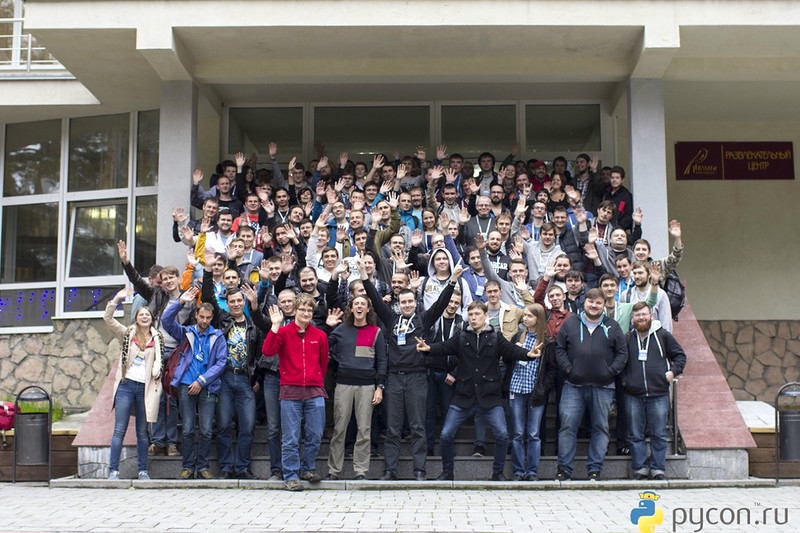
The conference began with the reports of foreign speakers. CPython developer Benjamin Peterson (San Francisco, USA) gave a talk on “Python Packaging Progress”, and Scikit-learn, joblib, Mayavi and nilearn, a researcher at the National Research Institute INRIA in France, taught how to budget create advanced data processing environment.
')
Python Core Developer, engineer at DataRobot , organizer of PyCon Ukraine, one of the program directors of PyCon Russia, Andrey Svetlov (Kiev) told about Aiohttp - the most popular asyncio-compatible library. Watch the video if you want to try the asyncio approach, but don’t know where to start.
After lunch, the participants split into two streams. Grigory Petrov , a technical evangelist at VoxImplant , gave an overview report on modern approaches to caching in different areas of development in python, outlined the current state of the ecosystem and shared interesting cases from practice. And Ivan Savin ( IPONWEB ) told how to make logging enjoyable in a rapidly developing project.
At this time, in a parallel room, Mikhail Korobov ( ScrapingHub ) held a master class on word processing using machine learning.
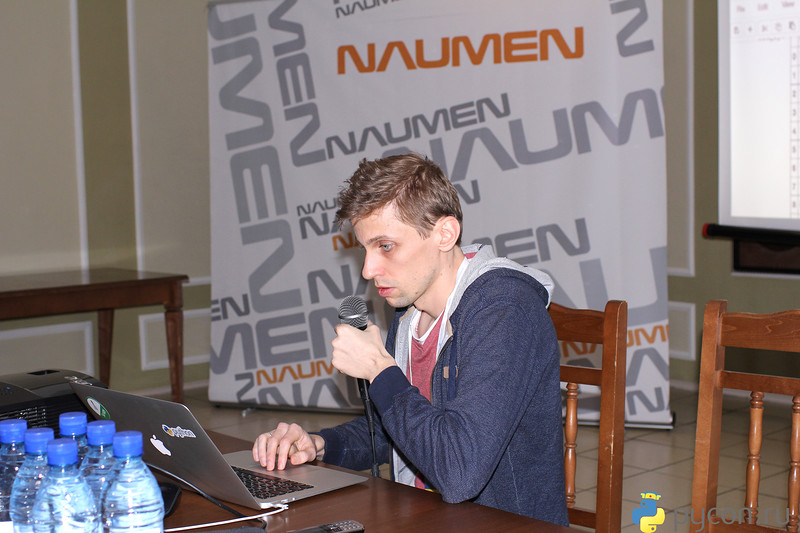
Andrei Vlasovskiy (St. Petersburg), the developer of PyCharm and the Vim emulator for programming environments in JetBrains , explained what type annotations are, where they can be useful and what they give.
Ilya Beda ( bro.agency ), spoke about caching methods based on ORM (a successful continuation of the report by Grigory Petrov), and Alexander Shchepanovsky ( funcy, cacheops ) about how to write your own rules for linters and not suffer the agonizing pain of their actions.
Konstantin Ignatov (Moscow) from Qrator Labs talked about creating setup.py and setup.cfg files.
The second day began with the report “Making of external DSL for Django ORM” from Python’s development engineer at Rambler & Co , the Rambler. Video team project Pavel Petlinsky (Moscow).
Alexander Shvets (Moscow), product director at Marilyn, spoke about architecture, logging and configuration of Celery for large projects.
In the small hall at this time, Andrei Vlasovskih held a master class on PyCharm .
Ekaterina Tuzova (St. Petersburg), PyCharm developer, told about the Numpy library. Be sure to look to anyone who is interested in scientific calculations and data analysis.
Dmitry Vakhrushev (Omsk) made a report on building a RESTful API on the Pyramid framework, and the developer of the Yandex.Taxi service, Valentin Sinitsyn (Yekaterinburg), spoke about memory management in python.
Alexander Kozlovsky and Alexey Malashkevich (St. Petersburg), the authors of the object-relational mapper Pony ORM , the speakers of PyCon-2014, this year taught how to create a one-page ReactJS application that uses PonyORM / PonyJS objects as models.
One of the founders of PyConRu, a member of the program committee of the last two conferences, and now a resident of Bonn and a specialist in programming at the United Nations, Anton Patrushev, spoke about several non-traditional techniques that helped him overcome performance problems.
Python Backend Developer and QA Automation Lead at Wargaming.NET Andrei Soldatenko from Kiev talked about full-text search using Python, and Alexander Sibiryakov , Python-developer at Scrapinghub (Czech Republic, Prague), about the new open source framework Frontera developed at Scrapinghub.
Sergey Matveenko, Senior Python Developer of DataArt, made a report on how Python is used in the most popular and actively developing IT direction “Internet of Things”.
Yandex authorization systems developer Kirill Borisov (Moscow) taught how to avoid a routine for a programmer, and Vitaly Glibin , co-founder of the service for running vacancies at Huntflow , explained why server-side templateization is needed in 2015 and why it is important.
At the end of each day, participants talked about their projects on Lightning Talks.
In the evening of the first day, participants were waited for plov, pizza, beer, bonfire and traditional game store from Ideco (with the mafia in English with the participation of foreign speakers). In addition, we played a bunch of prizes from sponsors. It seems to us, it turned out mentally.
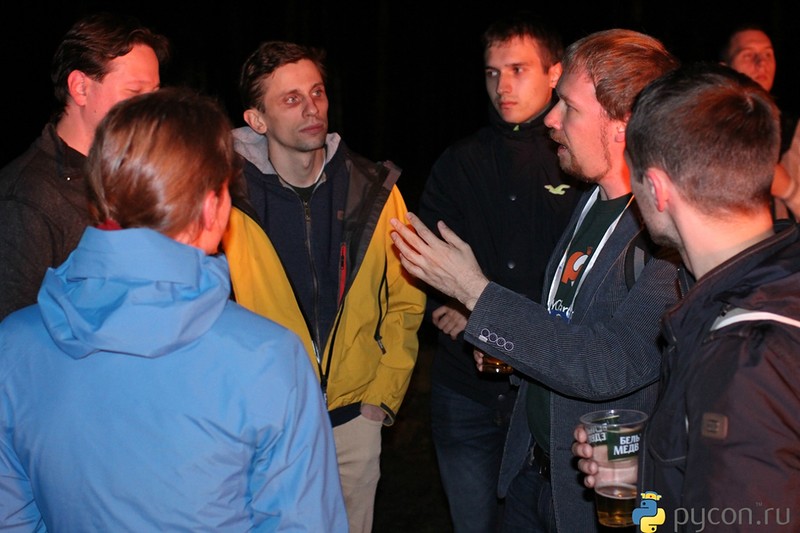
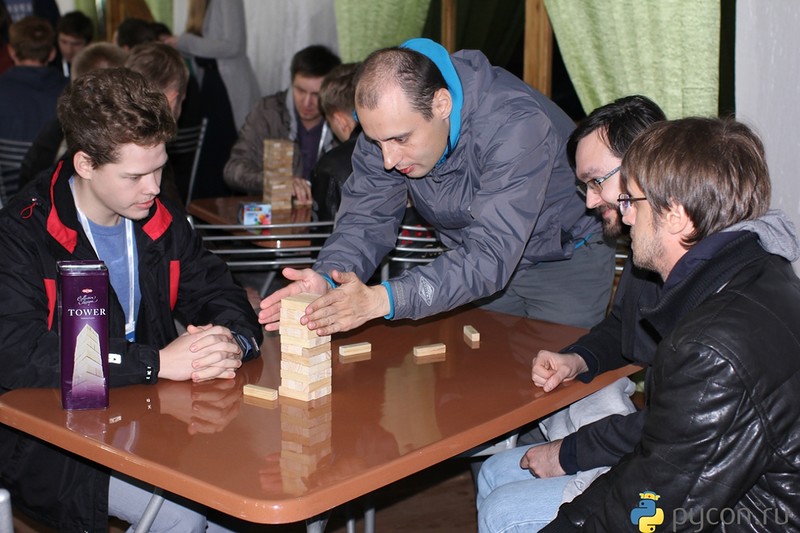

All videos are on our channel .
See photos from the conference here and here .
Presentations are here .
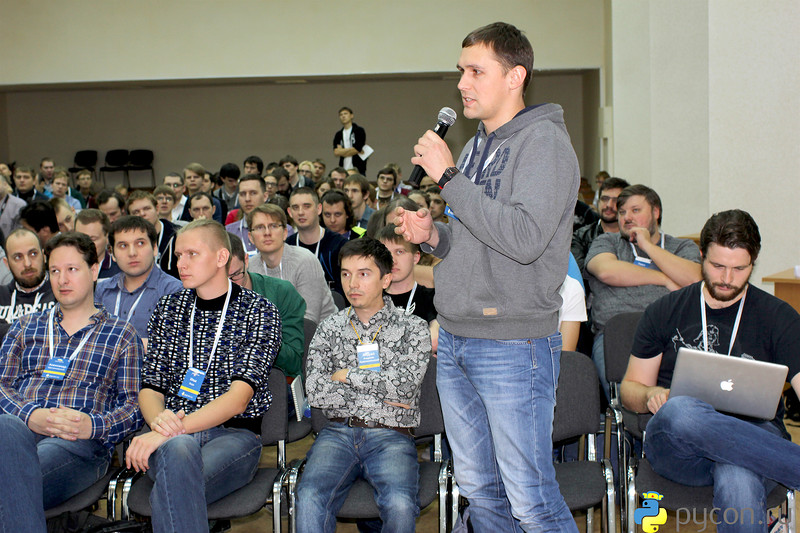
Thanks to the sponsors who made the conference possible: Wargaming, JetBrains, Naumen, Rambler & Co, Ideco, NetAngels.
Special thanks to the program committee. Andrei Vlasovskiy, Roman Imankulov, Andrei Svetlov, Dmitry Ovchinnikov, Danila Shtan, Mikhail Korobov, thank you for your advice, for the runs, for everything you did to make PyCon interesting and useful!
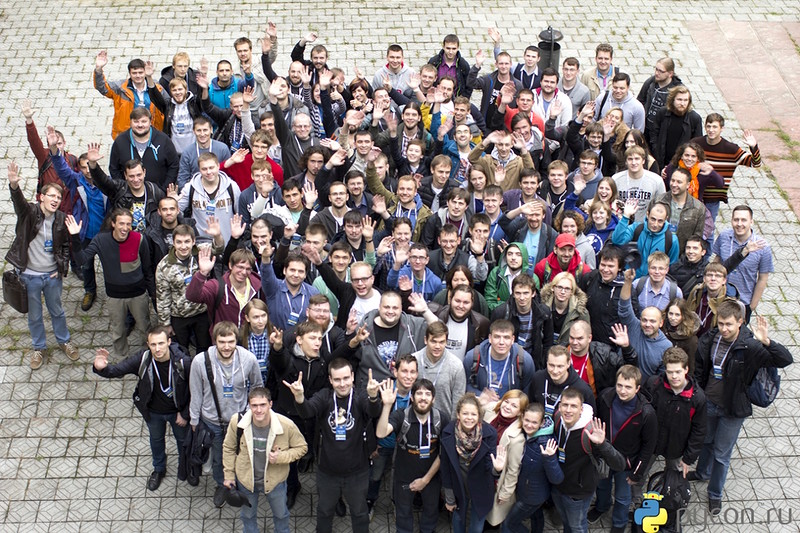
Pythonists, we are waiting for you next year at PyCon Russia-2016!

Pythonists gathered from 25 cities, including: San Francisco, Paris, Prague, Bonn, Tallinn, Minsk, Kiev, Moscow, St. Petersburg, Kazan, Ufa
The conference began with the reports of foreign speakers. CPython developer Benjamin Peterson (San Francisco, USA) gave a talk on “Python Packaging Progress”, and Scikit-learn, joblib, Mayavi and nilearn, a researcher at the National Research Institute INRIA in France, taught how to budget create advanced data processing environment.
')
Python Core Developer, engineer at DataRobot , organizer of PyCon Ukraine, one of the program directors of PyCon Russia, Andrey Svetlov (Kiev) told about Aiohttp - the most popular asyncio-compatible library. Watch the video if you want to try the asyncio approach, but don’t know where to start.
After lunch, the participants split into two streams. Grigory Petrov , a technical evangelist at VoxImplant , gave an overview report on modern approaches to caching in different areas of development in python, outlined the current state of the ecosystem and shared interesting cases from practice. And Ivan Savin ( IPONWEB ) told how to make logging enjoyable in a rapidly developing project.
At this time, in a parallel room, Mikhail Korobov ( ScrapingHub ) held a master class on word processing using machine learning.

Mikhail Korobov talks about machine learning
Andrei Vlasovskiy (St. Petersburg), the developer of PyCharm and the Vim emulator for programming environments in JetBrains , explained what type annotations are, where they can be useful and what they give.
Ilya Beda ( bro.agency ), spoke about caching methods based on ORM (a successful continuation of the report by Grigory Petrov), and Alexander Shchepanovsky ( funcy, cacheops ) about how to write your own rules for linters and not suffer the agonizing pain of their actions.
Konstantin Ignatov (Moscow) from Qrator Labs talked about creating setup.py and setup.cfg files.
The second day began with the report “Making of external DSL for Django ORM” from Python’s development engineer at Rambler & Co , the Rambler. Video team project Pavel Petlinsky (Moscow).
Alexander Shvets (Moscow), product director at Marilyn, spoke about architecture, logging and configuration of Celery for large projects.
In the small hall at this time, Andrei Vlasovskih held a master class on PyCharm .
Ekaterina Tuzova (St. Petersburg), PyCharm developer, told about the Numpy library. Be sure to look to anyone who is interested in scientific calculations and data analysis.
Dmitry Vakhrushev (Omsk) made a report on building a RESTful API on the Pyramid framework, and the developer of the Yandex.Taxi service, Valentin Sinitsyn (Yekaterinburg), spoke about memory management in python.
Alexander Kozlovsky and Alexey Malashkevich (St. Petersburg), the authors of the object-relational mapper Pony ORM , the speakers of PyCon-2014, this year taught how to create a one-page ReactJS application that uses PonyORM / PonyJS objects as models.
One of the founders of PyConRu, a member of the program committee of the last two conferences, and now a resident of Bonn and a specialist in programming at the United Nations, Anton Patrushev, spoke about several non-traditional techniques that helped him overcome performance problems.
Python Backend Developer and QA Automation Lead at Wargaming.NET Andrei Soldatenko from Kiev talked about full-text search using Python, and Alexander Sibiryakov , Python-developer at Scrapinghub (Czech Republic, Prague), about the new open source framework Frontera developed at Scrapinghub.
Sergey Matveenko, Senior Python Developer of DataArt, made a report on how Python is used in the most popular and actively developing IT direction “Internet of Things”.
Yandex authorization systems developer Kirill Borisov (Moscow) taught how to avoid a routine for a programmer, and Vitaly Glibin , co-founder of the service for running vacancies at Huntflow , explained why server-side templateization is needed in 2015 and why it is important.
At the end of each day, participants talked about their projects on Lightning Talks.
Afterparty
In the evening of the first day, participants were waited for plov, pizza, beer, bonfire and traditional game store from Ideco (with the mafia in English with the participation of foreign speakers). In addition, we played a bunch of prizes from sponsors. It seems to us, it turned out mentally.

The main value of the conference is round-the-clock communication with colleagues.


Pioneer bonfire for a long time did not let go
Materials
All videos are on our channel .
See photos from the conference here and here .
Presentations are here .

Thanks
Thanks to the sponsors who made the conference possible: Wargaming, JetBrains, Naumen, Rambler & Co, Ideco, NetAngels.
Special thanks to the program committee. Andrei Vlasovskiy, Roman Imankulov, Andrei Svetlov, Dmitry Ovchinnikov, Danila Shtan, Mikhail Korobov, thank you for your advice, for the runs, for everything you did to make PyCon interesting and useful!

Pythonists, we are waiting for you next year at PyCon Russia-2016!
Source: https://habr.com/ru/post/269223/
All Articles